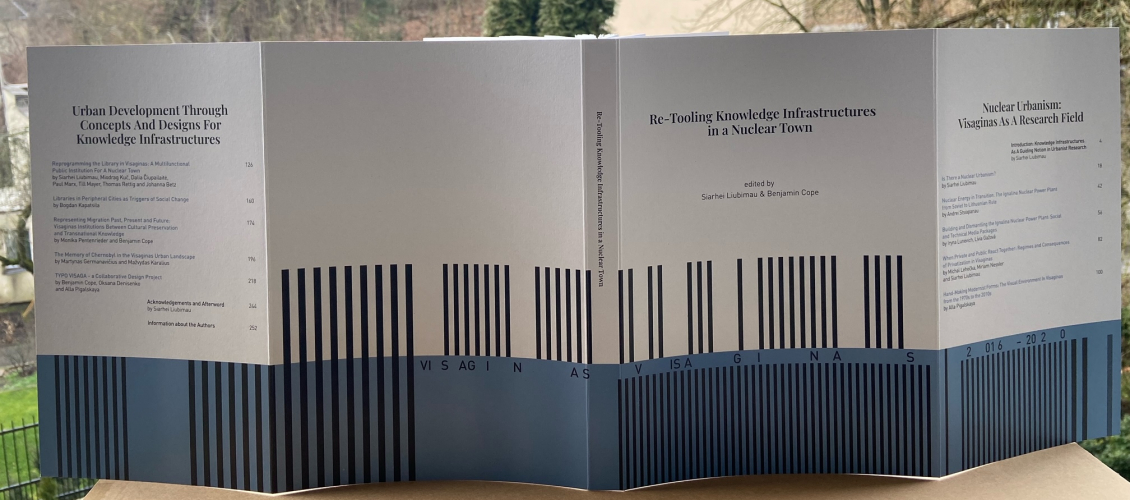This book started in 2016 as a search for concepts, empirical registers and urbanist tools to tackle the dead-end of Soviet industrial modernist mono-functionalism. The empirical setting for this search was the energy town of Visaginas, planned and built in the 1970s and 1980s with the sole purpose of servicing the major electricity provider to Soviet Lithuania, Latvia, Belarus and Kaliningrad: the Ignalina Nuclear Power Plant. From 2010, the INPP no longer generates energy and is in the process of being dismantled. Visaginas thus is facing dilemmas over its purpose after nuclear power. The scaffolding that gave rise to the book is five applied urbanist summer schools on the town’s future, organized by the European Humanities University’s Laboratory of Critical Urbanism annually from 2016 to 2020. This period involved preparatory research to make the summer schools’ work processes empirically grounded, as well as the research and urbanist proposals resulting from the schools themselves (each lasting for 10-14 days) and side projects of the schools’ faculty, participants and social partners. The chapters of this book comprise both research centered and proposal centered contributions, aiming to set-up and sustain an intersection of research, educational and urban development approaches to Visaginas’s manifold dilemmas: all subsumed under the prefix “post-”, but opening up different horizons for conceptual and applied urbanist work. Those horizons involve various perspectives on mono-functionalism, the nuclear, industrialism, modernism, Soviet socialism and the Chernobyl catastrophe, as well as on exceptionalism in terms of political decision making. In order to conceptually and empirically saturate the “post-” prefix, we initially aimed to describe and make sense of the process of the de-hermitization of city/industry relations since the beginning of the INPP decommissioning.
In our work, we soon realized that the Ignalina Nuclear Power Plant was not only an aggregation of technologies, a source of revenue, a pool of well-paid jobs and a locus of political power; but that it was equally a knowledge infrastructure: “a network of people, artifacts and institutions that generate, share and maintain specific knowledge about the human and natural worlds” (Edwards 2010, 17). This definition implies both that any massively shared knowledge is essentially a socio-technical system and that any socio-technical system creates and naturalizes a certain mode of knowledge. Paul Edwards himself writes mainly about the elements of science and a scientific outlook, such as acknowledged facts or theories, that need to be undergirded by well-invested and stable knowledge sharing systems consisting of data storage capacities, conference rooms, laboratories, interfaces, fellowships, libraries, the requirements and procedures involved in joining the community of scholars, etc. Our research borrows this valuable observation and its notions in order to apply them to the opening up of city/industry relations. In contrast to most of the STS sympathizing scholars of the nuclear field, whose focus is mainly spatially limited within control rooms, laboratories and the loci of techno-political decision-making, we have tried to construct a wider relational research setting and to empirically trace the social reproduction of the Soviet nuclear socio-technical system in a complex Soviet and Cold War geography, as well as in its transitions in the independent Lithuania and the EU. The Ignalina Nuclear Power Plant not only created Visaginas’s economic specialization and political function; it also disciplined its population, created solidarity among them, as well as defining the perspective on here and there, past and future, us and them. In this light, de-industrialization leads to the disruption of the established modes to produce and distribute knowledge, for the closure of any industrial facility is a breakdown of specific forms of collectivity and of their relation to both their inter-urban and intra-urban environments. This is especially relevant in the Soviet context, where living and social reproduction environments were deliberately measured as expressing a given site’s productive character in the frame of the all-Union economy.
Re-Tooling Knowledge Infrastructures in a Nuclear Town is co-authored by Johanna Betz, Benjamin Cope, Dalia Čiupailaitė, Oksana Denisenko, Lívia Gažová, Martynas Germanavičius, Bogdan Kapatsila, Mažvydas Karalius, Miodrag Kuč, Michal Lehečka, Siarhei Liubimau, Iryna Lunevich, Paul Marx, Till Mayer, Miriam Neßler, Monika Pentenrieder, Alla Pigalskaya, Thomas Rettig, and Andrei Stsiapanau.
The book can be purchased from Vilnius Academy of Arts Press.
NB! The launch of the book will be held online on December 9, at 5-7 PM (Vilnius time) via Zoom. To participate, please register via the link.
